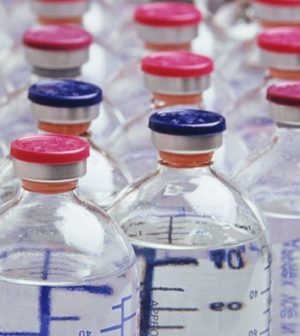- 10 Strategies to Overcome Insomnia
- Could Artificial Sweeteners Be Aging the Brain Faster?
- Techniques for Soothing Your Nervous System
- Does the Water in Your House Smell Funny? Here’s Why
- Can a Daily Dose of Apple Cider Vinegar Actually Aid Weight Loss?
- 6 Health Beverages That Can Actually Spike Your Blood Sugar
- Treatment Options for Social Anxiety Disorder
- Understanding the Connection Between Anxiety and Depression
- How Daily Prunes Can Influence Cholesterol and Inflammation
- When to Take B12 for Better Absorption and Energy
COVAX Program Has Now Sent 1 Billion COVID Vaccines to Poorer Nations

The latest shipment of 1.1 million COVID-19 vaccines to Rwanda this weekend signaled a noteworthy achievement: The COVAX program, a United Nations-backed program providing poorer countries with vaccines, has now shipped one billion of the doses to combat the coronavirus in 144 countries.
But still, that “is only a reminder of the work that remains,” the World Health Organization (WHO) said in a statement. WHO has long pushed for rich countries and vaccine developers to prioritize COVAX.
“COVAX’s ambition was compromised by hoarding/stockpiling in rich countries, catastrophic outbreaks leading to borders and supply being locked,” the WHO said in the statement. “And a lack of sharing licenses, technology and know-how by pharmaceutical companies meant manufacturing capacity went unused.”
The statement also noted that 36 of the organization’s member countries had still only vaccinated 10% of their populations, with 88 of the countries vaccinating less than 40%.
A current goal is to vaccinate 70% of the countries’ populations by early July, WHO Director-General Tedros Adhanom Ghebreyesus said in late December, the Associated Press reported.
“With updated vaccines in the pipeline, now is the moment for all citizens to demand that governments & pharmaceutical companies share health tools globally & bring an end to the death & destruction cycles of this pandemic, limit new variants and drive a global economic recovery,” WHO said in the statement.
In September, President Joe Biden announced that the United States would buy 500 million more doses of the Pfizer coronavirus vaccine to donate to countries in need.
Speaking to the Funke newspaper group, Svenja Schulze, the new international development minister for Germany, expressed plans to leverage Germany’s presidency this year of the Group of Seven industrial nations to help prioritize adequate resources for COVAX.
As one possibility, Schulze said she wants to expand help for developing countries via partnerships between companies so that more vaccines can be produced under license. She did not advocate waiving vaccine companies’ patents, the AP reported.
“I doubt that developing countries would get vaccines more easily if we waive the patents,” Schulze reasoned.
More information
The U.S. Centers for Disease Control and Prevention has more on COVID-19.
SOURCES: Associated Press; World Health Organization, statement, Jan. 16, 2022
Source: HealthDay
Copyright © 2026 HealthDay. All rights reserved.










